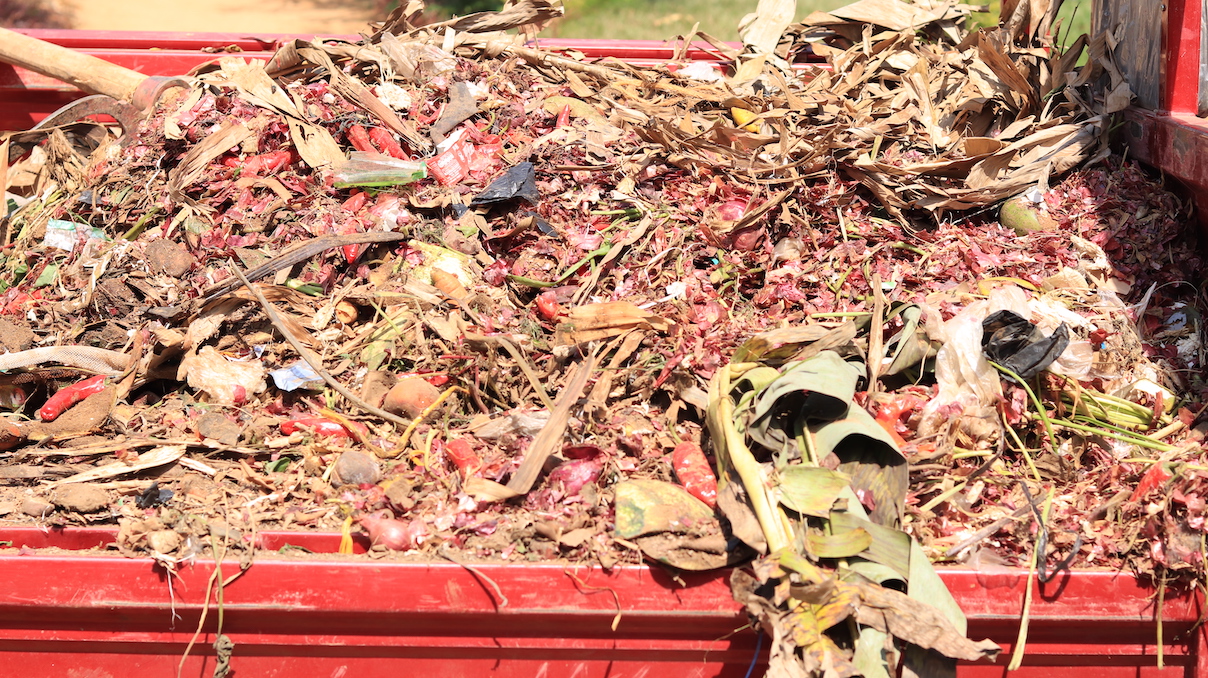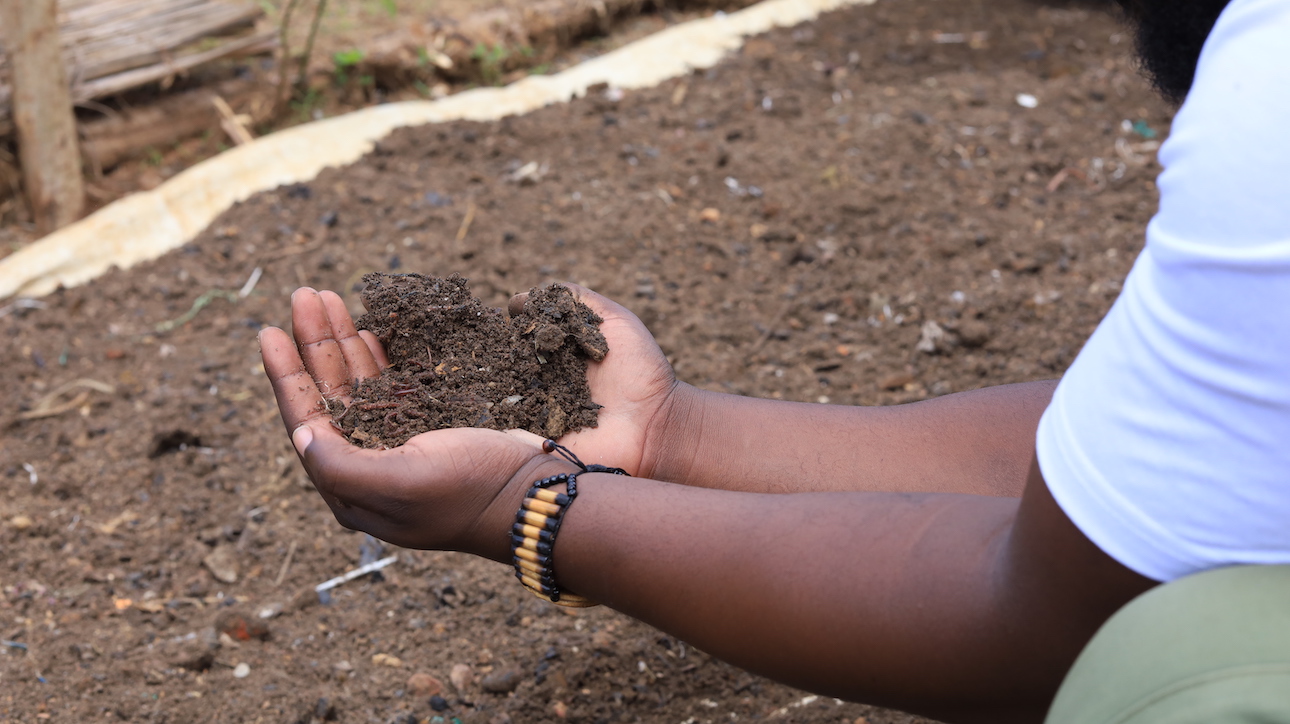In a world where sustainable practices are gaining prominence, Vermicomposting has emerged as a powerful solution that bridges the gap between waste reduction, soil enrichment, and community empowerment. At its core, Vermicomposting harnesses the prowess of earthworms to transform organic waste into nutrient-rich Vermicompost – a natural fertiliser that revitalises soil and fosters plant growth. Let’s delve into the world of Vermicomposting and explore its multifaceted benefits.
We will also discuss how Vermicomposting is beneficial to the people of Nakivale and how the team at Unidos are continuing to foster sustainable practices to feed its residents and empower its communities.
Vermicomposting and Unidos
Creating a resilient community where people can grow abundant food starts with having control and understanding holistic land management. Among all this, having or applying Vermicomposting is the key ingredient to catalyse and make the land more productive to get in return organic food that will help refugees to prevent hunger crisis.
Through this effort and great work, Unidos has opened up to great collaboration with different regenerative organisations like Realliance, Lush and UNHCR World Refugee Day 2023 – Refugees bringing hope away from home to adopt a systemic approach that prioritises complementary ecological and socioeconomic interventions to enhance regenerative agriculture practices in and around Nakivale.
So, What is Vermicomposting and How Does It Differ from Traditional Composting Methods?
Vermicomposting is an organic waste recycling process that enlists the assistance of earthworms to break down organic materials into nutrient-dense Vermicompost, often referred to as “worm castings” which is essentially worm faeces or waste. Unlike traditional composting methods, which involve microbial decomposition, Vermicomposting hinges on the remarkable capabilities of specific composting worms, such as the diligent Red Wigglers. These worms are adept at consuming organic waste and speeding up the decomposition process, resulting in a faster and more efficient breakdown compared to traditional composting methods.
Benefits of Vermicomposting on Soil and Plant Health
The positive impact of Vermicomposting on soil and plant health is profound:
- Enhanced Nutrient Availability: Vermicompost is laden with vital nutrients like nitrogen, phosphorus, potassium, and micronutrients in a form that’s readily accessible to plants. This fosters robust growth and overall vitality.
- Improved Soil Structure: Vermicompost’s organic matter enhances soil structure, promoting better aeration, root penetration, and overall plant health.
- Water Retention: Vermicompost’s water retention properties aid in reducing water usage, enhancing a plant’s drought tolerance, and preventing soil erosion.
- Pathogen Suppression: Beneficial microorganisms in Vermicompost help suppress harmful pathogens in the soil, reducing the risk of soil-borne diseases in plants.
- Stimulated Growth: Growth-promoting hormones and enzymes in Vermicompost lead to stronger stems, increased branching, and more abundant flowering and fruiting.
- Seed Germination: Vermicompost provides an ideal environment for seed germination and early seedling growth.
- Soil Diversity: Vermicompost contributes to soil diversity, fostering a more resilient and healthier ecosystem.
Choosing the Right Organic Waste for Vermicomposting

Suitable organic waste for vermicomposting includes:
- Fruit and vegetable scraps
- Coffee grounds and tea bags
- Eggshells
- Plant trimmings
- Shredded paper and cardboard
- Food-soiled paper
- Non-citrus fruit peels
At Nakivale, we avoid adding meat, dairy, oily foods, pet waste, and excessive citrus peels, as these items can disrupt the composting process. This would slow the process down or stop it altogether, so our team is very careful to compost the correct ingredients to make the best organic fertiliser in the soil.
Earthworms: Nature’s Recycling Champions
Two earthworm species stand out for vermicomposting:
- Eisenia Fetida (Red Wigglers): These worms are voracious consumers of various organics, reproducing quickly and enriching the compost.
- Perionyx Excavatus (Indian Blues): Similar to Red Wigglers, they’re heat and cold-tolerant, making them adaptable to various climates.
Components of a Successful Vermicomposting System
A thriving Vermicomposting setup includes:
- Worm Bin: A controlled environment where worms break down waste.
- Bedding Material: Provides a habitat and carbon base.
- Earthworms: Red wigglers are the top choice.
- Organic Waste: Kitchen scraps, peels, coffee grounds, and more.
- Moisture Control: Keep bedding damp but not waterlogged.
- Temperature and Airflow: Maintain suitable conditions for the worms.
- Avoid Harmful Substances: Keep out anything that can destroy the composting process.
Environmental Benefits of Vermicomposting
Vermicomposting champions environmental sustainability by:
- Waste Reduction: Diverting organic waste from landfills reduces greenhouse gas emissions.
- Greenhouse Gas Emissions: Vermicomposting’s aerobic nature lowers methane production.
- Soil Health: Enriches soil structure, nutrient content, and microbial activity.
- Reduced Chemical Fertiliser Use: Minimises reliance on synthetic fertilisers.
- Sustainable Agriculture: Nurtures a closed-loop system for nutrient cycling.
- Biodiversity Support: Earthworms enhance soil health and ecosystem balance.
Empowering Communities through Vermicomposting
In communities like Nakivale, initiatives like Vermicomposting hold tremendous promise. Our organisation – Unidos Projects – is pioneering efforts to introduce Vermicomposting to local farmers and residents of Nakivale, enabling them to unlock the potential of nutrient-rich vermicompost. By rejuvenating soil fertility, boosting crop yields, and promoting a sustainable way of life, Vermicomposting is fast becoming a catalyst for positive change.
Not only that, but with Vermicomposting, we can boost the sustainability of our practices, creating a long-term solution to food growth, health, and even employment.
The Promising Future of Vermicomposting at Nakivale
Vermicomposting has emerged as a beacon of hope for the Nakivale farming community. As approximately 36% of the population comprises farmers, adopting this innovative practice could lead to a transformational shift. By harnessing Vermicomposting’s potential, the community can foster food security, restore barren lands, and pave the way for a resilient and self-sufficient ecosystem.
Vermicomposting exemplifies the power of nature in waste reduction, soil rejuvenation, and community development. This eco-friendly practice not only enriches soil and nurtures plant growth but also empowers communities to create a sustainable future.
The team at Nakivale are incredibly excited for the future. When faced with adversity – chiefly through the reduction in food aid – our programme has sought to make Nakivale an independently thriving community, where people can grow their own food. To do this, they need the right conditions for growth, and so Vermicomposting is an exceptional pathway that will lead us to long-term sustainability and independence locally.
We want to empower local people by teaching them the methods they need to grow their own food and control their own future.
You can find out more about our project at Nakivale by heading to our website.

